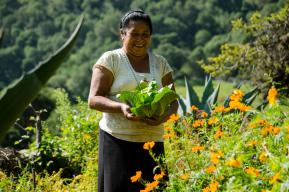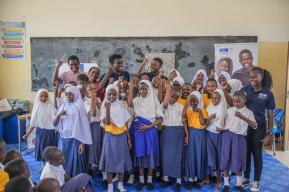
Project
Basic Education Equivalency Programme (BEEP)

Cambodia has experienced rapid economic development over the past decade. However, not all Cambodian youth have the skills and competencies to meet current and future labour market needs. School dropouts remain a challenge today, especially at the lower secondary level, with economic factors being the main reason for young Cambodians leaving school early. Youth from vulnerable groups facing disadvantages due to poverty, gender, disability and geographical location are often most at risk of dropping out. Lacking the required academic qualifications and skills, many are excluded from obtaining decent employment.
To address this, the Ministry of Labour and Vocational Training (MLVT), Ministry of Education, Youth and Sport (MoEYS) and UNESCO launched the Basic Education Equivalency Programme (BEEP) to provide out-of-school youth with basic education equivalency and skills development opportunities. The programme is part of the Decent Employment for Youth in Cambodia (DEY), a joint UN initiative to support young Cambodians to obtain decent and productive employment opportunities.
As poverty is the primary factor driving school dropouts in Cambodia, most out-of-school youths are often engaged in full-time professional activities to support their families. The flexible mobile learning modality of BEEP allows learners to complete their lower secondary education through free online-based courses without disrupting their full-time employment. Learners who complete the programme receive a certificate equivalent to Grade 9 that is accredited by the MoEYS and MLVT, which enables them to enrol in skills training at TVET institutes under the MLVT or General and Technical High Schools under the MoEYS. To further support learners who do not have access to a personal smartphone or computer, BEEP learning centres are equipped with internet access, tablets and computers. A total of 50 facilitators – two for each learning centre – have been recruited and trained to guide learners. Since the opening of the first learning centre in 2019, over 1,500 learners – including school dropouts, TVET students, and low-skilled and unemployed youth – have benefitted from BEEP.
To support its implementation and expand its reach, BEEP has been successful at forging public-private partnerships to advance Cambodia’s national education priorities. With support from telecommunications companies to provide ICT equipment and internet services, more out-of-school youth have been able to access the programme anytime, anywhere. Furthermore, the support from private sector partners is critical to advancing digital education in Cambodia to equip Cambodian youth with digital skills, one of the critical skills for the 21st century.
BEEP is currently in its expansion phase to increase basic education completion and enhance human resources to support Cambodia’s development aspirations to become a middle-income country by 2030. The expansion includes a nationwide rollout of BEEP, strengthening the capacity of facilitators to provide career guidance to learners and improving accessibility to BEEP for young persons with disabilities.
As of 2023, there are 26 BEEP learning centres in 15 provinces across Cambodia, ensuring that more out-of-school youth and marginalised populations in Cambodia have access to basic education equivalency opportunities for further skills training to support them in gaining decent and productive employment.









